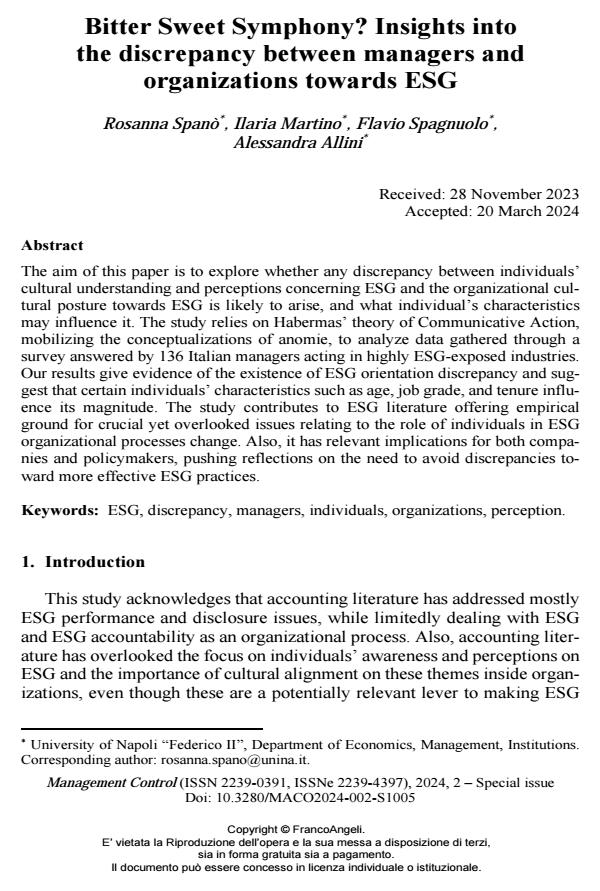Bitter Sweet Symphony? Insights into the discrepancy between managers and organizations towards ESG
Journal title MANAGEMENT CONTROL
Author/s Rosanna Spanò, Ilaria Martino, Flavio Spagnuolo, Alessandra Allini
Publishing Year 2024 Issue 2024/2 Suppl.
Language English Pages 23 P. 75-97 File size 347 KB
DOI 10.3280/MACO2024-002-S1005
DOI is like a bar code for intellectual property: to have more infomation
click here

FrancoAngeli is member of Publishers International Linking Association, Inc (PILA), a not-for-profit association which run the CrossRef service enabling links to and from online scholarly content.
The aim of this paper is to explore whether any discrepancy between individuals’ cultural understanding and perceptions concerning ESG and the organizational cultural posture towards ESG is likely to arise, and what individual’s characteris-tics may influence it. The study relies on Habermas’ theory of Communicative Action, mobilizing the conceptualizations of anomie, to analyze data gathered through a survey answered by 136 Italian managers acting in highly ESG-exposed industries. Our results give evidence of the existence of ESG orientation discrepan-cy and suggest that certain individuals’ characteristics such as age, job grade, and tenure influence its magnitude. The study contributes to ESG literature offering empirical ground for crucial yet overlooked issues relating to the role of individuals in ESG organizational processes change. Also, it has relevant implications for both companies and policymakers, pushing reflections on the need to avoid discrepan-cies toward more effective ESG practices.
Keywords: ESG, discrepancy, managers, individuals, organizations, perception.
- Benchmarking Sustainability: A Comparative Case Studies Analysis of ESG Practices in the Heating, Ventilation, and Air Conditioning Industry Monica Veneziani, Marcello Cosa, Riccardo Torelli, Dina Lucia Todaro, in MANAGEMENT CONTROL 3/2026 pp.65
DOI: 10.3280/MACO2025-003004
Rosanna Spanò, Ilaria Martino, Flavio Spagnuolo, Alessandra Allini, Bitter Sweet Symphony? Insights into the discrepancy between managers and organizations towards ESG in "MANAGEMENT CONTROL" 2 Suppl./2024, pp 75-97, DOI: 10.3280/MACO2024-002-S1005